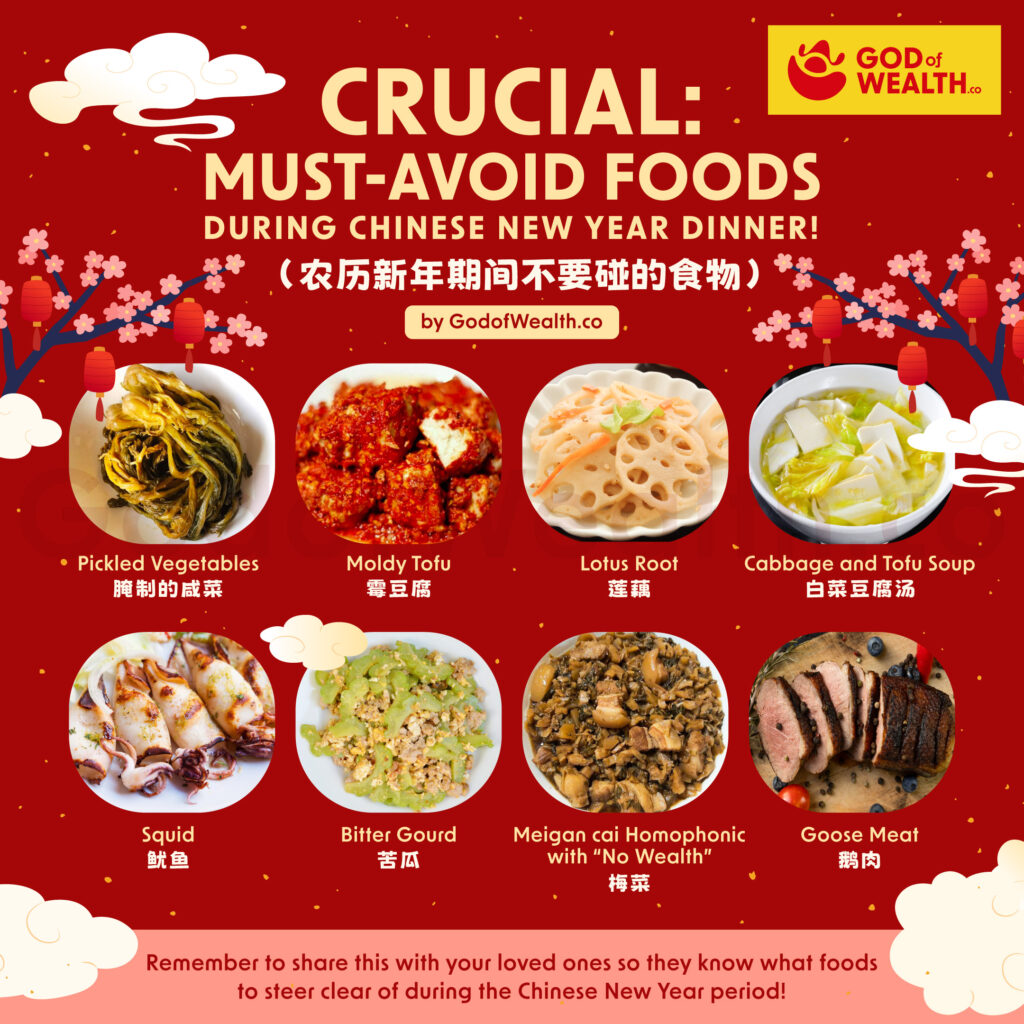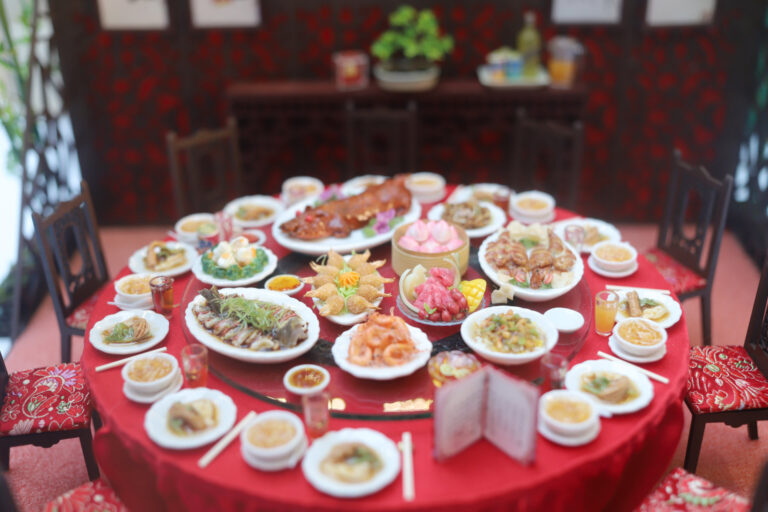Lunar New Year‘s Eve stands as a beacon of reunion, where the centerpiece of celebration is the much-anticipated reunion dinner. This occasion calls for careful consideration in the kitchen, as the selection of dishes goes beyond mere preference. Certain foods, despite our personal fondness for them, are traditionally left off the menu.
The wisdom of the older generation, shaped by years of experience and challenges, lends weight to these culinary traditions. They hold a deep respect for the practices passed down through generations, focusing keenly on the symbolism behind each dish.
As we gather around the table for the Chinese New Year’s Eve reunion dinner, it’s important to remember that certain foods are considered ‘inauspicious’ and are best avoided not only during the Chinese New Year’s Eve reunion dinner but also throughout the Chinese New Year period.
This adherence to ancient traditions serves to welcome good fortune and ward off any negativity as we step into the new year.
Table of Contents
Food to Avoid During CNY Reunion Dinner
Normally, we can eat these dishes whenever we want, but it’s best to avoid them during the reunion dinner, especially the types mentioned below.

1. Pickled Vegetables (腌制的咸菜)
In the past, there were few fresh vegetables available in winter, so people mainly ate dried vegetables and some pickled ones, prepared in advance for times when there were no vegetables available.
Therefore, it is considered inauspicious to serve pickled vegetables during New Year’s Eve reunion dinner, as the meal should be abundant in meat and fish, symbolizing prosperity for the coming year.
The older generation rarely eats pickled vegetables during New Year’s, so it’s best not to serve them.
2. Moldy Tofu (霉豆腐)
This is another salty dish common in rural areas, especially towards the end of the year when there’s a tradition of making tofu. The excess is often turned into moldy tofu. Even in times of scarcity, moldy tofu would not be served during New Year’s Eve dinner.
Not only does moldy tofu carry a bad omen, but it also lowers the grade of the dishes. It’s typically eaten for breakfast or when one has no appetite.
Since New Year’s Eve reunion dinner is a time for family to eat together joyously, moldy tofu should preferably not be served.
Some individuals also refrain from consuming regular tofu, as its white color traditionally associates it with mourning; hence, it’s believed that only those in mourning would eat in tofu.
3. Lotus Root (莲藕)
Many might wonder why lotus root, being so delicious, should be avoided. Indeed, whether stir-fried or used in soup, it’s very tasty. However, once cut, lotus root reveals many holes, which to the elderly symbolize financial loss.
No one wants their efforts throughout the year to go to waste, unable to make money. Therefore, lotus root, with its holes also interpreted as “every road is empty,” should not appear at the New Year’s Eve reunion dinner.
For auspiciousness, it’s best to prepare more meat dishes and save lotus root for after the New Year.
4. Cabbage and Tofu Soup (白菜豆腐汤)
Cabbage soup is very bland, symbolizing “utter poverty.” Moreover, some believe that eating cabbage soup during New Year’s Eve dinner could lead to gossip in the following year, and consuming soupy dishes might imply that adults will be away from home all year, working hard with nothing to show for it.
Therefore, cabbage and tofu soup, with its inauspicious meaning and low status, should ideally not be served during New Year’s Eve reunion dinner.
5. Squid (魷魚)
Squid In coastal areas like ours, where seafood is abundant and reasonably priced, my family often buys squid to steam or stir-fry, which is delicious. However, it’s best not to cook squid on New Year’s Eve. Since the Spring Festival marks the beginning of the year, some young people start job hunting only after the New Year.
The saying “being fired” (炒魷魚, literally “fried squid” in Chinese) makes this dish particularly inauspicious, especially for young people who have just found jobs.
As we value festivity during the New Year, it’s best not to serve foods with inauspicious meanings.
6. Bitter Gourd (苦瓜)
Due to its bitter taste, bitter gourd is considered inauspicious at the New Year’s Eve dinner. The word “bitter” resembles “hardship” in Chinese, symbolizing difficulty and suffering. In fact, any food with the word “bitter,” such as bitter melon, bitter chrysanthemum, and bitter greens, should be avoided.
During this time of reunion, family members hope for a sweet and happy year ahead, free from troubles. Thus, it’s best to keep these bitter-tasting foods off the reunion dinner table.
7. Meigan cai Homophonic with “No Wealth” (梅菜)
Meigan cai or preserved mustard greens are considered inauspicious for New Year’s Eve dinner because they are homophonic with “no wealth.” In traditional beliefs, the New Year should bring “great luck and prosperity,” so Meigan cai, associated with “no wealth,” are naturally unwelcome.
On this special occasion of New Year’s Eve reunion dinner, we of course hope for symbols that are more auspicious and fortunate, rather than being “held back” by the homophony of the ingredients.
8. Goose Meat (鹅肉)
Goose meat, delicious and nutritious, is a delicacy enjoyed by many. However, because “goose” is homophonic with “hungry,” it’s not considered appropriate for the reunion moment of New Year’s Eve reunion dinner.
People hope for a new year filled with ample food and clothing, making goose meat an unsuitable choice for the Spring Festival. Therefore, despite its delicious taste, goose meat is rarely seen on the New Year’s Eve dinner table.
Welcoming Prosperity with Tradition
Choosing the right foods for your CNY reunion dinner is a crucial step in aligning with tradition and setting the stage for a prosperous year ahead. This careful selection is part of a broader practice aimed at ensuring good fortune and happiness.
Yet, the journey towards a prosperous Lunar New Year encompasses more than just the culinary choices we make.
To fully embrace the festive spirit, consider welcoming the God of Wealth into your home, praying to the Jade Emperor for blessings, finding out the auspicious time to go visiting friends and family, and discovering lucky items to keep in your wallet.
Each of these practices offers a unique way to attract good luck and prosperity, complementing the thoughtful considerations made for your reunion dinner.
Explore these traditions to enrich your celebration and usher in a year of abundance and joy.
What is a reunion dinner?
A reunion dinner is a traditional meal held on Lunar New Year’s Eve, where family members gather to celebrate and welcome the new year together.
Why is the reunion dinner important?
The reunion dinner symbolizes family unity, prosperity, and the hope for a fortunate year ahead. It’s a significant tradition in Chinese culture to strengthen family bonds.
What are common dishes served at a reunion dinner?
Common dishes include fish (symbolizing surplus), dumplings (resembling gold ingots for wealth), spring rolls, steamed chicken, and vegetable dishes, each carrying auspicious meanings.
Can vegetarians enjoy a reunion dinner?
Yes, vegetarian options for a reunion dinner include dishes like Buddha’s delight (Lo Han Jai), vegetarian spring rolls, and mushroom dumplings, all rich in symbolism and flavor.
How can I host a reunion dinner if my family is far away?
Hosting a virtual reunion dinner through video calls is a great way to connect with distant family members. Sharing recipes and eating similar dishes can help maintain the tradition across distances.
Are there any foods to avoid during a reunion dinner?
Traditionally, it’s advised to avoid foods with negative connotations, such as certain types of squash (symbolizing bad luck) and bitter foods (symbolizing hardship).
What is the significance of serving fish at the reunion dinner?
Serving fish is significant for its homophonic association with surplus and prosperity in Chinese. It’s often served whole to symbolize a good beginning and end to the year.



